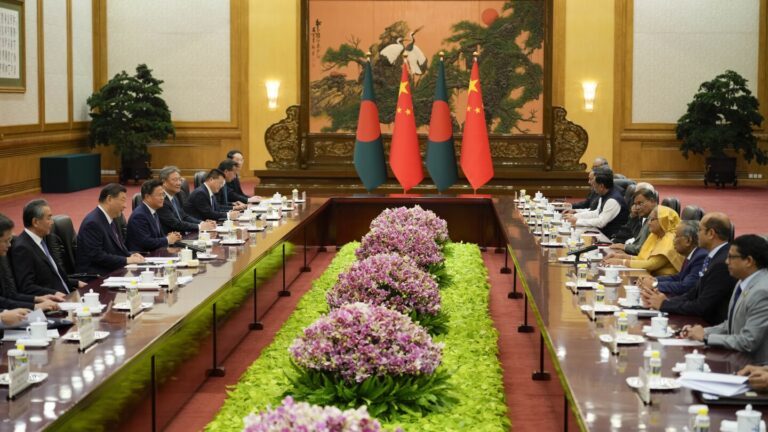BEIJING (AP) — China and Bangladesh reaffirmed their ties Wednesday during Bangladeshi Prime Minister Sheikh Hasina’s visit to Beijing amid rising tensions in the region over territorial disputes and resources.
“China and Bangladesh respect each other and treat each other as equals, setting a good example of friendly coexistence and mutually beneficial cooperation,” China’s state-run Xinhua News Agency quoted Wang Huning, a member of the Standing Committee of the Politburo of the Communist Party of China, who met with Hasina.
Xinhua reported that Hasina later met with Chinese President Xi Jinping and “elevated relations between the two countries to a comprehensive strategic cooperative partnership.” No details were given, but the relationship designation generally includes closer economic ties, largely funded by Chinese policy banks.
Bangladesh occupies a strategic location between Myanmar, a longtime Chinese ally currently mired in civil war, and India, a rising Asian power with which China has a long-standing border dispute.
Hasina met her Chinese counterpart Li Qiang on Wednesday and witnessed the signing of 28 bilateral agreements, mostly on trade and investment.
Bangladesh maintains development partnerships with the United States and India but is also growing closer to China, which is heavily involved in major infrastructure projects in the country.
Hasina is keen to strengthen ties to encourage Chinese investment in her economy, which faces challenges under a heavy debt burden. China has also supplied Bangladesh with tanks, missile launchers and other weaponry and is building ports, railways, power plants and bridges. The United States remains Bangladesh’s largest source of foreign direct investment.
Hasina’s visit to China comes just weeks after her visit to India and signals plans to build cooperation with both neighbours amid growing U.S. interest in the Indo-Pacific region.
China has publicly sided with Hasina as the United States and European countries pressured her government to hold free and fair elections in January. China has also said it is willing to help Bangladesh’s economy as it faces dwindling foreign-exchange reserves.
Bangladeshi media reports said the country plans to seek $20 billion in new loans from China during Prime Minister Hasina’s visit.
Concerns are growing over border tensions between China and India, Chinese military advances into the South China Sea and Indian Ocean, fighting in neighbouring Myanmar and Beijing’s control over water resources in the Himalayas that is affecting agriculture in Bangladesh and neighbouring countries.
___
Associated Press writer Julhas Alam in Dhaka, Bangladesh, contributed to this report.

